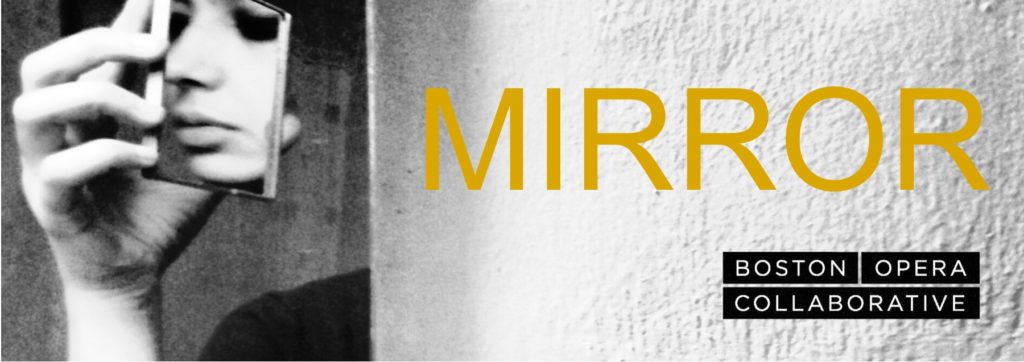 Presented by Boston Opera Collaborative
Presented by Boston Opera Collaborative
Frauenliebe und –leben
Music by Robert Schumann
Text by Adelbert von Chamisso
From the Diary of Virginia Woolf
Music by Dominick Argento
Text from the diaries of Virginia Woolf
Directed by Greg Smucker & Patricia-Maria Weinmann
January 6-8, 2017
Longy School of Music of Bard College
Cambridge, MA
Boston Collaborative Opera on Facebook
Review by Gillian Daniels
(Cambridge, MA) Two portraits of women, written over a century apart. The first is an idealized character looking to not only marry, but be subsumed by her husband’s identity in a happy, storybook life. In German, she sings of having no desire beyond being this man’s wife. She is the heroine of Robert Schumann’s Frauenliebe und -leben (A Woman’s Love and Life) from 1830, itself based on a series of poems by Adelbert von Chamisso. Two men filter the story of a fictional woman, a touching if pastel view of a girl coming of age. Carley DeFranco breathes life into this creature (also played by Susannah Thornton, Rhaea D’Aliesio, and Julia Cavallaro, depending on one’s tour of the Zabriskie House mansion where the show is staged) with a Disney-esque sweetness.
The heroine of Schumann’s song cycle is contrasted with no one less but Virginia Woolf. An unfair contest, certainly.
From the Diary of Virginia Woolf is an eight-part song cycle written by Dominick Argento in 1974 adapting sequences of the feminist, modernist author’s diary. Mezzo-soprano Britt Brown (Shannon Grace, and Krista Marie Laskowski) give us a complicated woman, anxious, funny, ambitious, and depressed by her own limitations.
Being based on reality, of course Woolf ultimately has a more textured depiction than her paper doll counterpart. But the contrast between songs is a revelation in identity politics, the perfect surface of a woman defined by men who stands next to a woman struggling to be seen as their equal.
Part of me worries that comparing the two creates a false binary, that a woman can either only be concerned with marriage and a conventional home life or else a career woman with many neuroses tangled in her ambitions. Woolf is a sort of ideal, herself.
Separate from this line of thought, between the two singers, there is a camaraderie, as if the years that separate them are illusionary. Brown’s Woolf is still responding to the social pressures put upon the ideal woman. The latter’s wholesome optimism and one-dimensionality might obscure something more beneath the surface, too, as she spends Woolf’s songs writing in a diary, herself.
For all her saccharine sweetness, the Schumann heroine certainly has strengths. The most memorable moment of the show comes as Britt Brown sings the sixth movement, “War.” Her terror of the oncoming World War II is real and dark, her despair vivid. Perhaps recent political events make the song especially dark. After Brown is done, however, DeFranco stands and takes her hand immediately, bravely, leading her to the next room. Her character has lived a life where most of her world has been beyond her control. The war is terrifying, but what is there to do but continue on? There is violence and bloodshed, terrible things on the horizon, but in the here and now, there are domestic responsibilities, hearth, and home.
Or maybe they are meant to be the same woman, cut in half, a wholly new character who both wants the storybook romance and marriage society confirms she should want but is also dealing with anxiety, intelligence, and creating art. It could be wishful thinking on my part, but it was a reading that seemed more and more probably as the show developed.
Whatever your reading, contrasting the song cycles is a beautiful idea, made more elegant by the choice to stage the show piece by piece in the labyrinthine Zabriskie House mansion at the Longy School of Music. What a wonderful concept, realized in immersive detail. Getting lost in the house between songs seems inevitable in retrospect, but at the time, it was far from unpleasant. I hope to see similar projects from the Boston Opera Collaborative.
Queen’s Note:
We have elected a tangerine ass-bugle bigot with scrawny hands, thin skin, and terrible hair to the office of the President. The theatre community has every reason to be scared that the national budget for the arts will be slashed. It will be. Certain republicans tend to disrespect experimental, avant-garde, or simply new art. If it challenges the white, straight, hetero status quo, they tend to be against it. New things frighten them with their difference. Belts will need to be tightened. For the love of all that’s sacred, keep creating your art despite this painful bullshit. If you need help, ask for it. Our existence is our resistance. Please keep fighting the good fight. – KD
#blacklivesmatter #translivesmatter #brownlivesmatter #yellowlivesmatter #lgbtqialivesmatter #immigrantlivesmatter #muslimlivesmatter #disabledlivesmatter #theatreartsmatter #NODAPL
